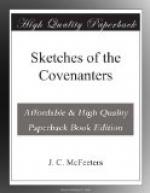The Covenanters, like the Israelites, flourished while in this great tribulation. They were fruitful, and increased abundantly, and multiplied, and waxed exceeding mighty; and the land was filled with them. The more they were afflicted, the more they multiplied and grew. Their ministers were numbered by hundreds; the people, who assembled in Conventicles, by tens of thousands. Oppression could not crush them; the furnace, though heated seven times more than it was wont, could not singe their garments. Their adversaries became alarmed and began to devise other measures. Their device was diabolical wisdom. Satan, having had more than three thousand years since he failed on Israel in Egypt, was now better up to his work. The king proposed to indulge the ministers. The royal indulgence was surely a product of the bottomless pit. The snare was laid six times and caught many unwary souls.
[Illustration: Anniversary of A conventicle.
The people of Scotland delight to do honor to the memory of the martyrs. In many places they hold anniversary meetings on the grounds made memorable by some signal event in the times of persecution. Here is the picture of one of these thrilling meetings, held on the scene of a Conventicle near Loudon-hill.]
The First Indulgence was granted in 1669. The expelled ministers were offered pardon, and permission to return to their churches on certain conditions stipulated by the king. Forty-two accepted the Indulgence, and by that very act conceded the king’s right to expel, and to recall, the ministers of Christ, at his own pleasure. The great principles for which they had suffered were thereby sacrificed—the supremacy of the Lord Jesus Christ over His Church, and the Church’s independence under Christ.
What were the conditions upon which these ministers returned? We give them in substance:
1. They must attend the meetings of the Prelatic ministers.
2. They must permit none of the people from other parishes to attend their services.
3. They must refrain from speaking or preaching against the king’s supremacy.
4. They must not criticize the king or his government.
The Indulgence, with such conditions, was accepted by forty-two ministers. Are we surprised? Do we wonder that so many relaxed under the strain of persecution, and returned to their own vine and fig tree? Let not censure, from her bowers of ease, be too severe. The hardships of these men were great, the sufferings excessive, the outlook dark. They were worn and sickly; they were filled with pain by exposure to storms, living in caves, and sleeping on the ground. Their lives were in jeopardy every hour. Yet it must be said that these ministers sacrificed much for which they had long and nobly battled; they capitulated on terms dictated by the enemy, surrendered their rights as the ambassadors of Christ, and accepted conditions that made them bond servants of King Charles. They were caught in the snare.




